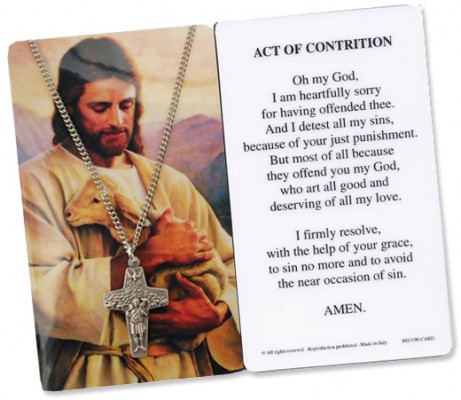
At the start of every new year families look at their schedule for the second half of the year. For many families that will involve the celebration of First Holy Communion for a child, niece, nephew or grandchild. In the focus on Communion, the sacrament of Reconciliation is often over looked. We wanted to share our family story of celebrating First Reconciliation.
From Childhood Baggage to an Adult Understanding
Elaine: The sacrament of Confession inspires two feelings in me. After I receive the sacrament I have an immense gratitude and lightness of heart that lifts me up as I leave the confessional. However, before I enter I struggle with procrastination and embarrassment. I mean, shouldn’t I be striving for perfection? How is it that I have failed again?
Chris: Thinking back to my First Reconciliation I have few memories except a sense of fear and dread. I anticipated the worst and expected judgment and shame. Even today, having had positive experiences as an adult and better understanding of the sacrament, when I approach Reconciliation that old baggage comes forward.
As our oldest approached his First Reconciliation we wanted an approach that would give him a different set of experiences and feelings about the sacrament. There are many elements of the encounter that you cannot control: the priest, the environment, the school/parish classes to prepare, but you can address other elements that are a huge part of the experience.
Elaine: I have always had a hard time with rote memorization. This brought me a feeling of panic when it was time to go to confession. I always worried that I would forget the Act of Contrition, have to then confess to the priest that I didn't remember, and then try, try again in the confessional until I got it right. It mirrored the feeling I had standing at the board in school and not being able to remember how to multiply 6x8. As a result, I brought shame, guilt, and embarrassment into the confessional and did not focus on the grace that was waiting for me there.
Looking back at those times from my adult perspective, I have compassion for my grade school self and the part of me that still thinks I need to be perfect. Now I try not to allow my fear to step in between me and the great grace that God has given us in the Sacrament of Reconciliation.
Chris: It wasn't until I was an adult that I began to understand Penance as a sacrament of healing (CCC#1421). It is not a visit to a courtroom, but a visit to the doctor’s office. An examination of conscience is not cross examination by a hostile attorney but a careful query of symptoms, to properly diagnose a spiritual illness. The pain is not from the treatment (reconciliation) but from the disease (sin).
How is Reconciliation lived in the home?
The way reconciliation is lived in the home profoundly affects every family member’s openness to the Sacrament of Reconciliation. If mistakes, conflicts, and wrongdoing are constructively addressed in our home, it is easier for our children to anticipate that the same will be true in Reconciliation with God. On the other hand, if there is anger, harshness, violence or fear surrounding mistakes or disobedience, Reconciliation will be more difficult. Moms and dads are like gods in their own house. They judge actions and attitudes, right and wrong, and dispense justice. It is important to model mercy, reconciliation and forgiveness in everyday situations if we want our children to anticipate the same from the sacrament.
 Even today, when old baggage gets in the way, you can provide a different experience for your children. Like most parts of parenting, you leave in the past those things which were harmful and make new roads for your children.
Even today, when old baggage gets in the way, you can provide a different experience for your children. Like most parts of parenting, you leave in the past those things which were harmful and make new roads for your children.
Elaine: As our children have prepared and gone through their First Reconciliation and First Communion it has given us an opportunity to look at the sacraments in a new way. It has been our hope that each of them will see the beauty in the sacraments.
Chris: I love the story of the Good Shepherd. Elaine was working with preschoolers using the Catechesis of the Good Shepherd at the same time that I was DRE and helping families and children prepare for Reconciliation. That image of the Good Shepherd became a significant part of Reconciliation preparation. Jesus is the shepherd and we are the sheep. The shepherd sees when we are lost. The sheep are worth finding. There is joy when a sheep returns to the fold. That sums it up, except for noticing that based on the story, sheep are inherently directionally impaired. That is not easy for this proud sheep to accept. Sin is like that, difficult to acknowledge.
Every Child is Unique
Elaine: Each child brings a different perspective to the event. One of our sons was worried he would take longer than anyone else in his class because he had so many things to confess. Our daughter worried that she would forget to say something and have to get back into line to start over. In the days leading up the First Reconciliation we would talk about it at the supper table to bring some of those fears to light. The younger siblings had the benefit of hearing stories from their older brothers and sisters. In honor of my own fear: each of the children was able to have a holy card, with the Act of Contrition written on it, to bring with them: in case they panicked and forgot what to say!
Chris: If you are looking for additional ideas on ways to prepare your child, Erika Marie recently outlined 5 Ways to Prepare Your Child for First Reconciliation on the CatholicMom.com site. It has some good nuts and bolts strategies.
Actually "Celebrating" the Sacrament
Elaine: In our large family, one of the ways that we try to bring attention to the specialness of First Reconciliation is one on one time. The day of Reconciliation both my husband and I attended. Sometimes we needed a babysitter (thanks Grandma!) Not only did our son or daughter go to Reconciliation, but they saw both of us go as well.
Chris: For our family, the celebration of joy after Reconciliation was important. It helped make the point "this matters". We elected to take the newly reconciled child out to dinner with just mom and dad.
Elaine: It is a rare event that both mom and dad are paying attention, exclusively to you, at the same time!
Chris: Our go-to place was a Japanese restaurant where they cook right in front of you. It would always be the first time our child went there. We would sit on either side, it was fun to watch the chef at work; there were chopsticks, knives, tossing things in the air and fire! Not the typical family dinner at home.
Elaine: Even our pickiest eater enjoyed that evening! The drama of the meal was a wonderful counterpoint to the prayerful and joyful attendance at church earlier in the day.
Chris: We also gave a gift. The attention given to First Communion can overshadow Reconciliation. While First Communion Gifts are common practice, we thought it was important to mark Reconciliation with a gift as well. Our favorite Reconciliation gifts have the image of the good shepherd or a sheep on them. A pendant, statue, picture or some other visual reminder of the moment when your child came back to God’s grace, reinforces the experience.
Elaine: Your family may celebrate this special day differently. How you are involved in helping your children prepare for First Reconciliation establishes a habit for a lifetime of grace. What is important is to listen to and respond to any fears they may have and reassure them of God’s love and mercy.
Copyright 2015, Chris and Elaine Weickert
Image credits: Children - DollarPhotoClub / Valua Vitaly
Holy Card - Chris Weickert (McVan Inc. product), All Rights Reserved
About the Author

Guest
We welcome guest contributors who graciously volunteer their writing for our readers. Please support our guest writers by visiting their sites, purchasing their work, and leaving comments to thank them for sharing their gifts here on CatholicMom.com. To inquire about serving as a guest contributor, contact editor@CatholicMom.com.


.png?width=1806&height=731&name=CatholicMom_hcfm_logo1_pos_871c_2728c%20(002).png)
Comments